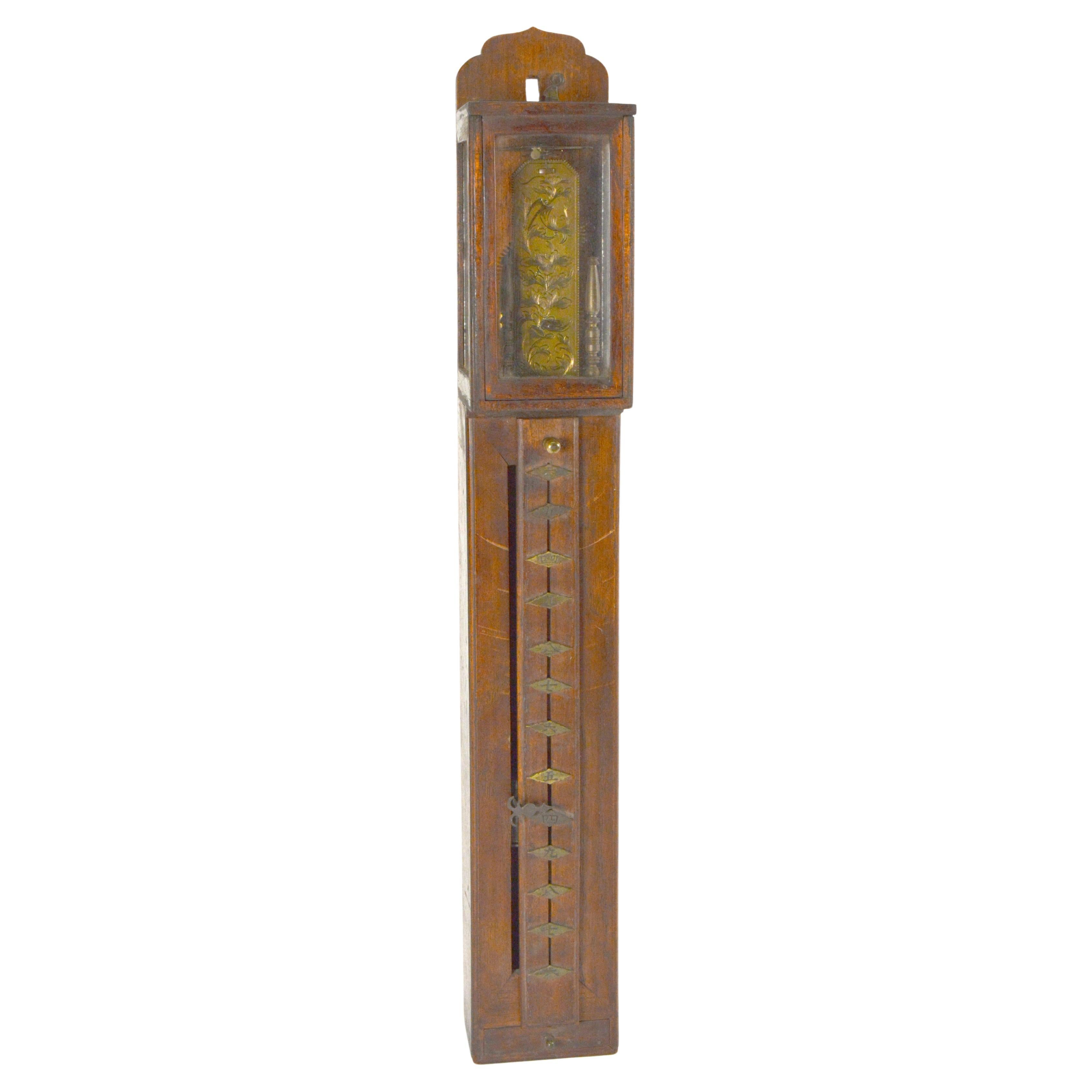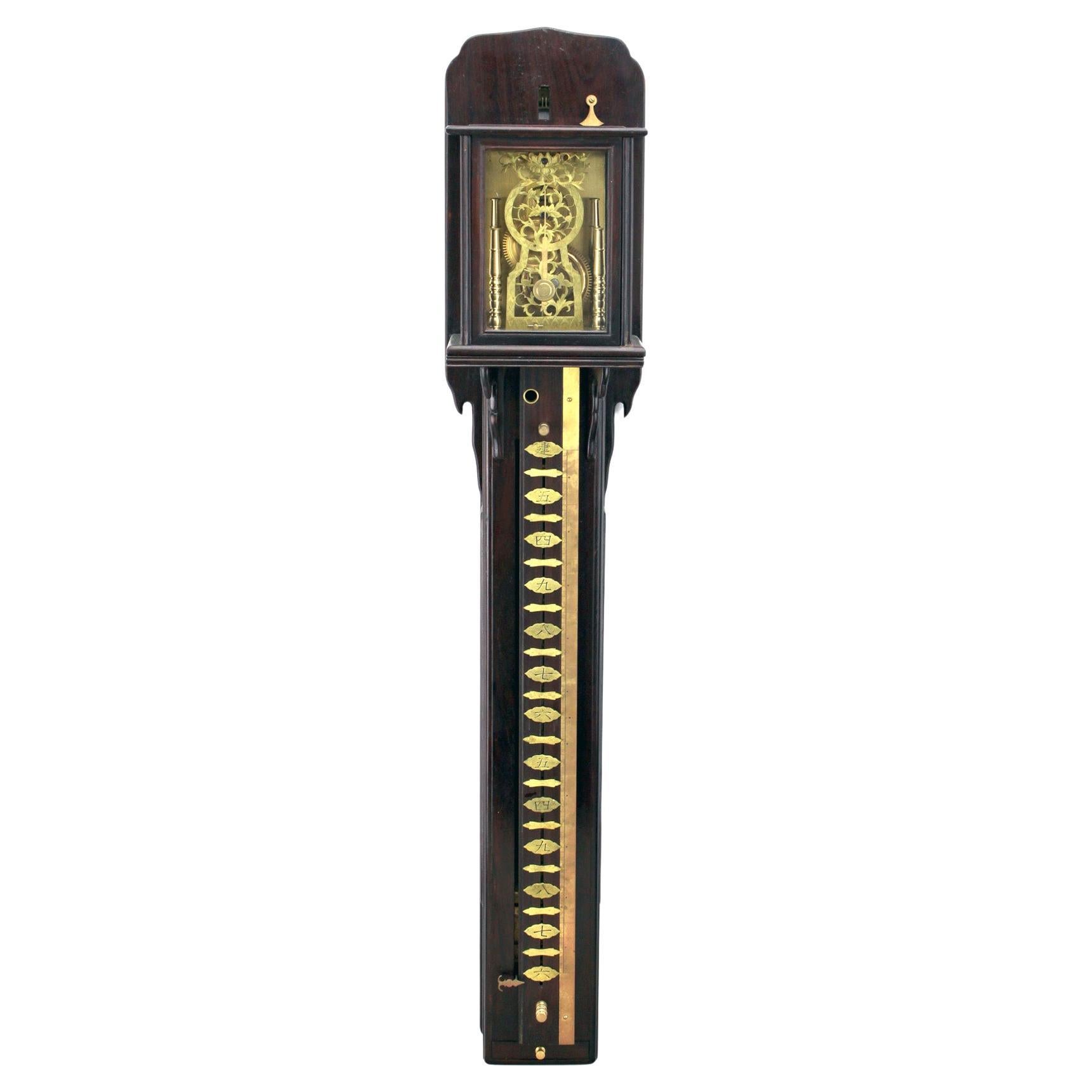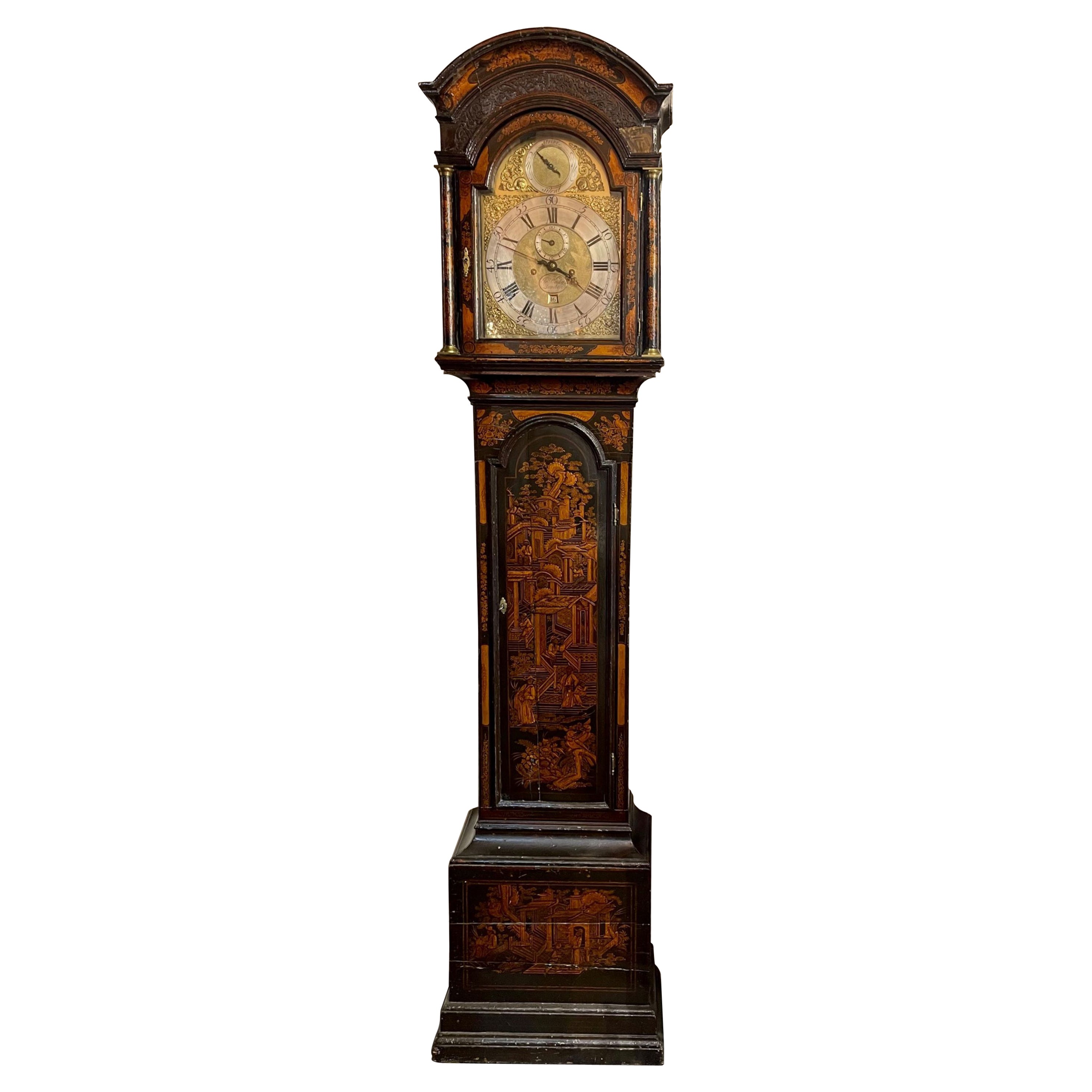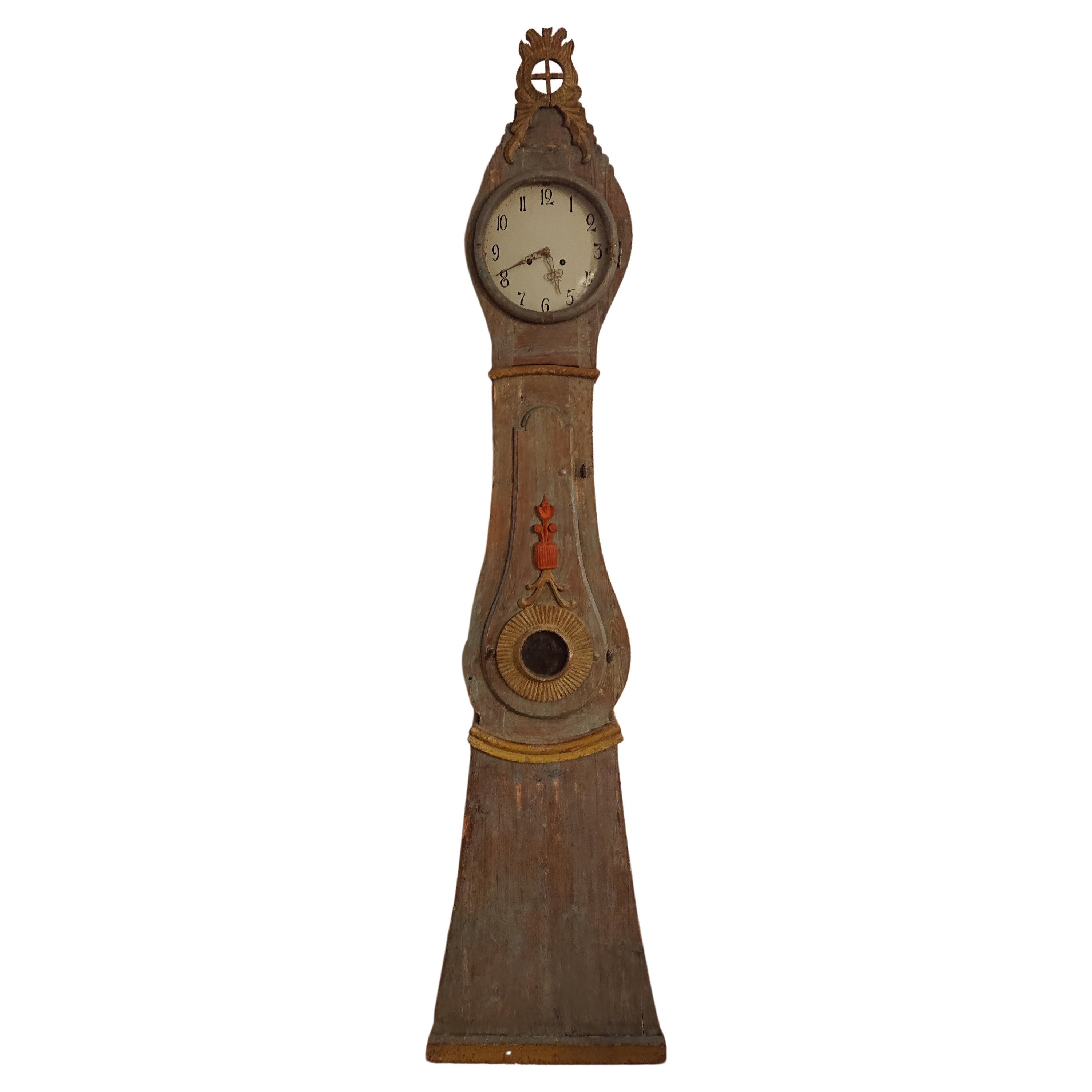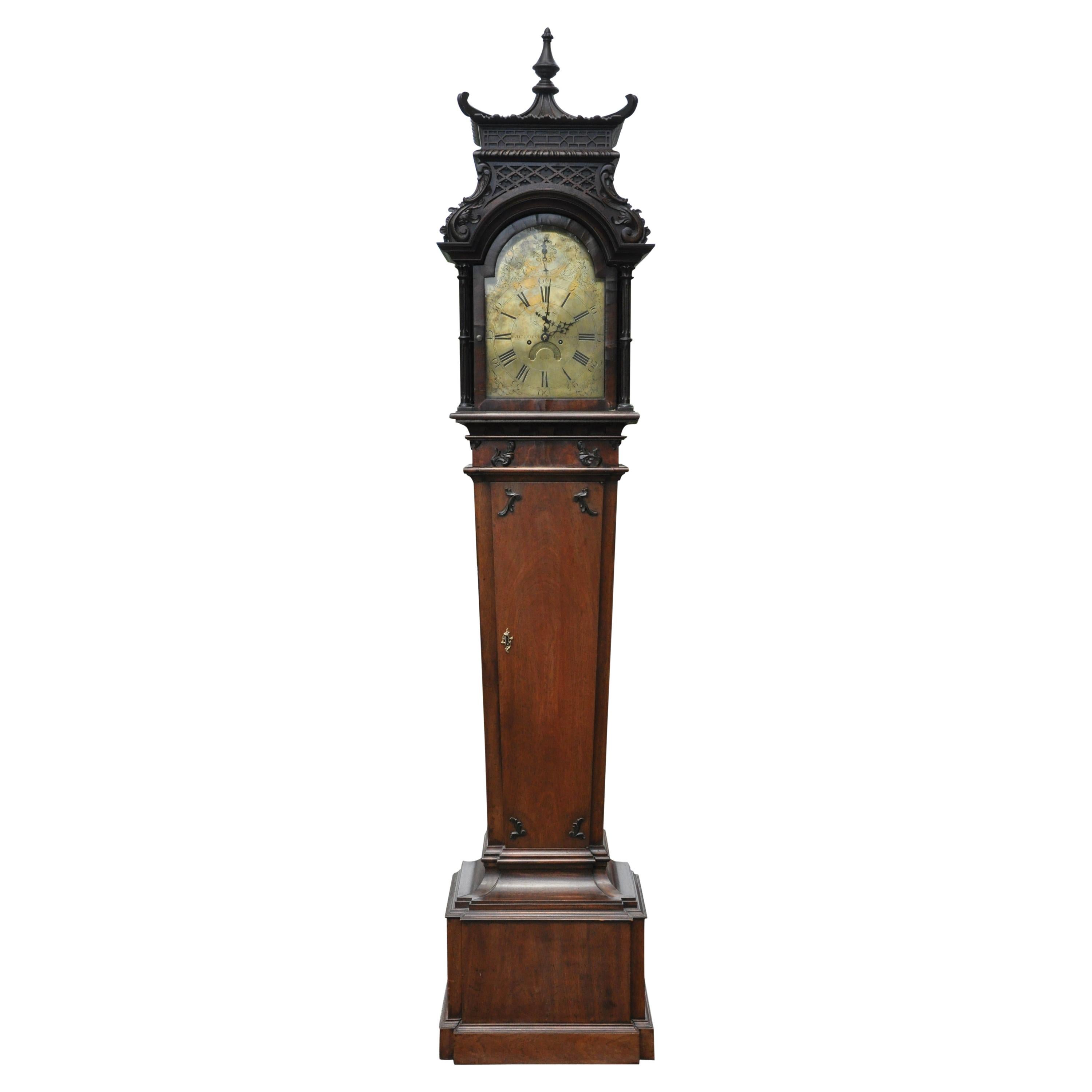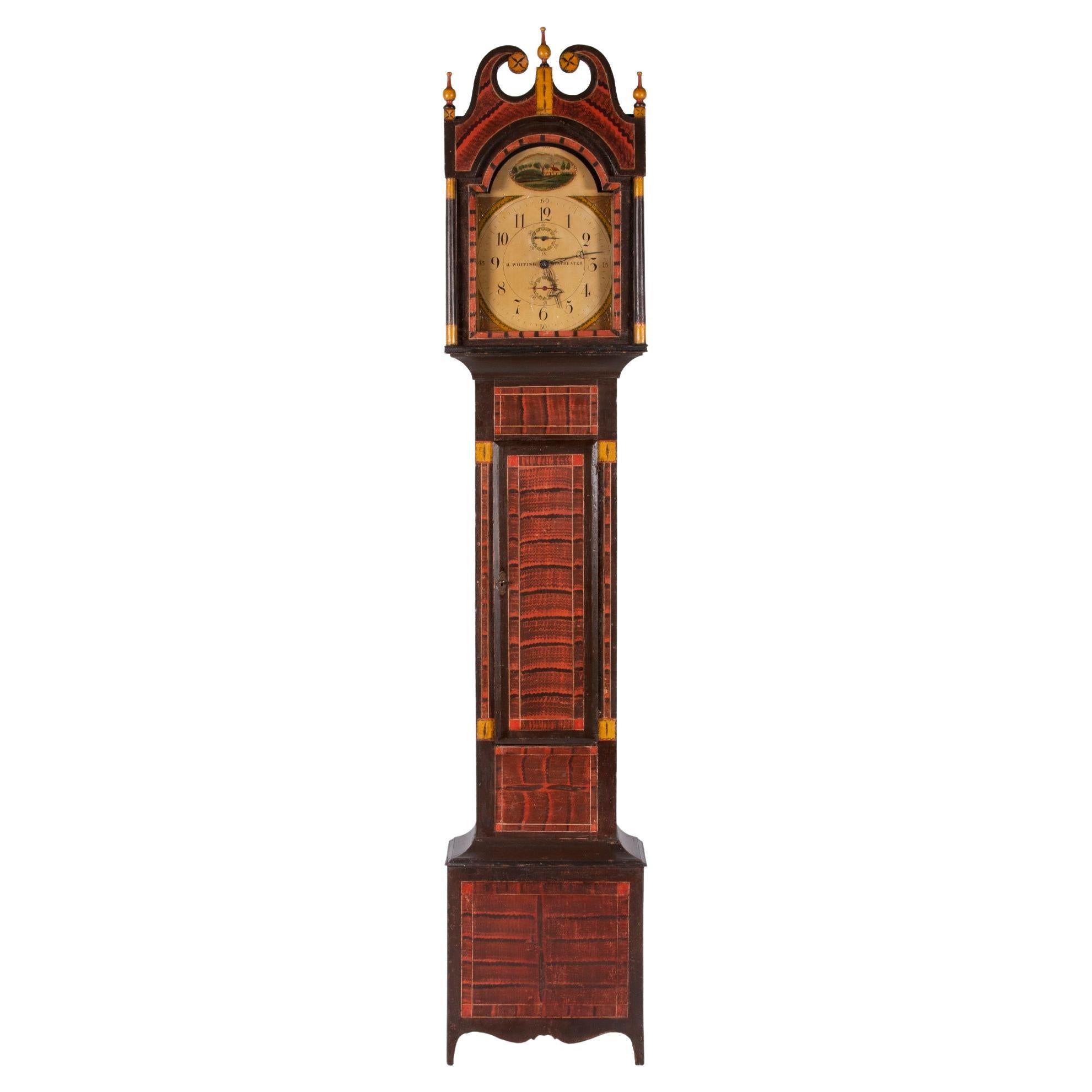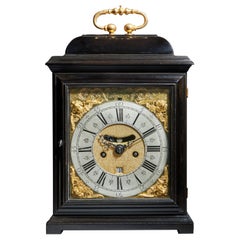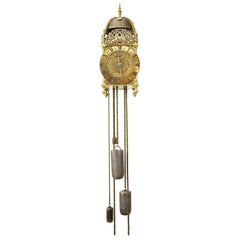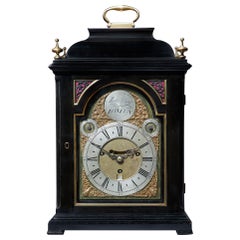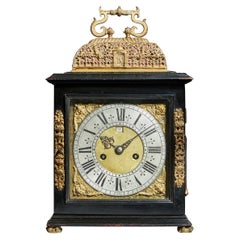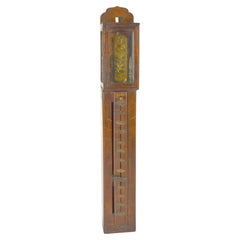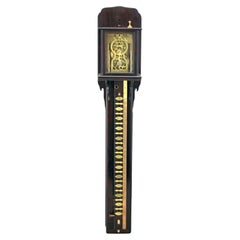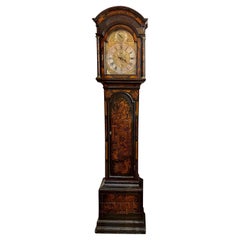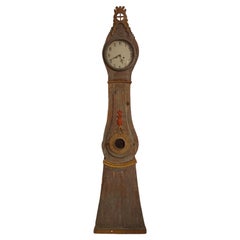Items Similar to Late Edo Period 19th Century Japanese Pillar Clock, Shaku-Dokei, C. 1820
Want more images or videos?
Request additional images or videos from the seller
1 of 5
Late Edo Period 19th Century Japanese Pillar Clock, Shaku-Dokei, C. 1820
$8,885.53
£6,500
€7,591.55
CA$12,390.43
A$13,573.99
CHF 7,090.79
MX$163,186.75
NOK 88,647.15
SEK 83,608.39
DKK 56,674.57
About the Item
Elegant Japanese pillar clock, 'SHAKU-DOKEI', c. 1820
The very fine 30-hour, weight-driven movement is constructed between bars and consists of a going train only. It has verge escapement with balance on top of the upper plate. Around the balance is a circular surround with an aperture. A small brass convex disc on the balance acts as a false 'pendulum'. It is driven by a lead weight which carries the hand. The skeletonised brass front is engraved with a chrysanthemum motif. Top and bottom plates are connected by four turned pillars.
The wooden dial - the pillar - has thirteen movable engraved brass hour chapters, called toki. The Japanese characters on the toki depict the following numbers from top to bottom: 6, 5, 4, 9, 8, 7, 6, 5, 4, 9, 8, 7, 6. The time is indicated by a pierced brass pointer which slides down the case trunk.
The movement is situated a shitan case, the hood being glazed on all sides so that the movement is entirely visible. To wind the clock, the hood can be removed by unlocking a wooden turnbuckle. The winding key is stored in a small drawer at the bottom of the pillar.
Height: 42 cm; width: 6cm; depth: 6cm.
Literature:
W. Brandes, Alte Japanische Uhren, München, 1976
N.H.N. Mody, Japanese Clocks, Rutland, 1977
E.L. Edwardes, Dutch Clocks & Their Japanese Connections, Ashbourne, 1996, pp.158 ff.
Note
Japanese time measurement is very different from its counterpart in the Western world. Instead of a fixed value for an hour the length of an hour in Japan, called toki is variable depending on the length of the day and night. Day and night are both divided into six toki, which lasts from sunrise to sunset and from sunset to sunrise. In summer the days are longer than the nights and consequently a day toki last longer than a night toki. In winter it is the other way around. This is the reason why Japanese clocks have sliding chapters to adjust the length of a toki. There are also clocks with a fixed chapter ring and a revolving hand. To regulate the lengths of the toki the weights on the foliot can be moved, which makes the clock go faster or slower. The hour numerals run from nine to four, the latter being midday. Japanese clocks indicate how many hours there are to come, whilst European clocks indicate how many hours have past. In Japan the figure 9 was holy. Each toki, twelve in total, also had its own sign of the zodiac, which were sometimes indicated on a ring around the chapter ring.
- Dimensions:Height: 16.54 in (42 cm)Width: 2.37 in (6 cm)Depth: 2.37 in (6 cm)
- Style:Edo (Of the Period)
- Materials and Techniques:
- Place of Origin:Japan
- Period:
- Date of Manufacture:1820
- Condition:Wear consistent with age and use.
- Seller Location:Oxfordshire, GB
- Reference Number:1stDibs: LU4936225934952
About the Seller
5.0
Recognized Seller
These prestigious sellers are industry leaders and represent the highest echelon for item quality and design.
1stDibs seller since 2019
24 sales on 1stDibs
Typical response time: A week
Associations
LAPADA - The Association of Arts & Antiques Dealers
- ShippingRetrieving quote...Shipping from: Faringdon , United Kingdom
- Return Policy
Authenticity Guarantee
In the unlikely event there’s an issue with an item’s authenticity, contact us within 1 year for a full refund. DetailsMoney-Back Guarantee
If your item is not as described, is damaged in transit, or does not arrive, contact us within 7 days for a full refund. Details24-Hour Cancellation
You have a 24-hour grace period in which to reconsider your purchase, with no questions asked.Vetted Professional Sellers
Our world-class sellers must adhere to strict standards for service and quality, maintaining the integrity of our listings.Price-Match Guarantee
If you find that a seller listed the same item for a lower price elsewhere, we’ll match it.Trusted Global Delivery
Our best-in-class carrier network provides specialized shipping options worldwide, including custom delivery.More From This Seller
View AllA rare 17th century English eight-day spring-driven table clock by J Gerrard
Located in Oxfordshire, United Kingdom
A Rare Late 17th Century English Eight-Day Spring-Driven Table Clock, Circa 1700. England
Signed J. Gerrard.
This exceptional late 17th-century English eight-day table clock is a s...
Category
Antique 17th Century English William and Mary Table Clocks and Desk Clocks
Materials
Brass
17th Century Lantern Alarm Clock by Johannes Quelch, Oxford
Located in Oxfordshire, United Kingdom
An English 17th century lantern clock made of brass and iron, circa 1665-1670. The clock consists of going and striking trains, as well as a...
Category
Antique 17th Century British Baroque Wall Clocks
Materials
Brass
Rare 18th Century George II Musical Table Clock by Matthew King, circa 1735
Located in Oxfordshire, United Kingdom
A rare George II musical table clock by Matthew King, circa 1735.
This unusual eight-day spring-driven table clock was made by Matthew King, wh...
Category
Antique 18th Century English George II Table Clocks and Desk Clocks
Materials
Silver, Brass
17th Century English eight-day spring-driven table clock, by John Wrench
Located in Oxfordshire, United Kingdom
A Rare Late 17th Century English Basket-Top Spring Clock by John Wrench of Chester, Circa 1695-1700. England
This exquisite late 17th-century English basket-top table clock, signed ...
Category
Antique 17th Century English William and Mary Table Clocks and Desk Clocks
Materials
Brass
Striking George IV Eight-Day Rosewood Pagoda Library Clock by French, London
By Santiago James Moore French
Located in Oxfordshire, United Kingdom
This lovely small library clock has a spring-driven eight-day twin chain-fusee movement with going and striking trains. The going train has anchor escapement with a short pendulum and stirrup regulation to facilitate adjusting the timing, which is accessible from the back. The rack striking indicates the hours of a gently sounding bell, which can be repeated at all times by pulling a cord to the side of the case.
The elegant chased and engraved arched gilt brass dial has a Roman chapter ring with five-minute and minute divisions. The maker has signed the dial above the middle: FRENCH ROYAL EXCHANGE...
Category
Antique Early 19th Century George IV Mantel Clocks
Materials
Brass
18th Century George III Figured Mahogany Three Pad Stricking Bracket Clock
Located in Oxfordshire, United Kingdom
18th century George III figured mahogany three pad bracket clock by John Wright Dorking, Circa 1780. England
A most attractive English bracket clock, made around 1780, signed on ...
Category
Antique 18th Century English George III Table Clocks and Desk Clocks
Materials
Brass
You May Also Like
Antique 19th c. Japanese Shaku Dokei Hanging Stick Pillar Wall Clock
Located in Danville, CA
Antique 19th c. Japanese Shaku Dokei Hanging Stick Pillar Wall Clock
Here I'm offering a very old Japanese stick clock or Shaku-Dokei. The wood case has a...
Category
Antique Late 19th Century Japanese Meiji Wall Clocks
Materials
Brass
25" Tall Japanese Ebony Shaku Dokei Striking Hanging Stick Pillar Wall Clock
Located in Danville, CA
25" Japanese Ebony Striking Stick Pillar Wall Clock
Here I'm offering a very good quality striking stick clock or Shaku-Dokei. The ebony wood case has a removable glazed hood with a lift-out front door, two fabric-backed gilt-brass pierced frets to the sides, a scale at the front and a drawer for the key at the bottom. The ebony hardwood case is made of solid rosewood and it shows beautiful grain of the wood.
Mounted to the backboard is the gilt-brass going movement with finely cut, turned and spoked gear work, turned brass baluster columns at the corners, an elaborately engraved fretted front plate and a verge escapement that is regulated by a small pendulum...
Category
Mid-20th Century Japanese Wall Clocks
Materials
Brass
19th Century English Chinoiserie Decorated Tall Case Clock
Located in Dallas, TX
Very special 19th century Englished Chinoiserie decorated tall case clock. Featuring very pretty Asian images along with a decora...
Category
Antique Mid-19th Century English Chinoiserie Grandfather Clocks and Long...
Materials
Metal
19th Century Swedish Rococo Tall Case Clock with Original Paint
Located in Boden, SE
19th century Rococo tall case clock from Boden Norrbotten, Northern Sweden. Made in wood. Nice details and carvings in shape of flowers and leav...
Category
Antique Early 18th Century Swedish Rococo Grandfather Clocks and Longcas...
Materials
Pine
19th Century Chinoiserie Tall Case Clock After Thomas Chippendale
By Thomas Chippendale
Located in Essex, MA
Late 19th century mahogany chinoiserie tall case clock after Thomas Chippendale. Made around circa 1890-1900 in exacting detail to Thomas C...
Category
Antique Late 19th Century English Chinese Chippendale Grandfather Clocks...
Materials
Mahogany
New England Tall Case Clock, Wooden Works by Riley Whiting, ca 1819-1835
Located in York County, PA
Exuberantly painted, New England tall case clock in dark umber, red, & chrome yellow decoration, with wooden works by riley whiting, Plymouth, Connecticu...
Category
Antique Mid-19th Century American Painted Furniture
Materials
Wood
More Ways To Browse
Clock Ring
Antique Lead Weights
Wind Antique Clock
Holland Clock
Chrysanthemum Plate
Dutch Antique Clocks
Pillar Clock
Japanese Pillar Clock
Shaku Dokei Clock
Shaku Dokei
Antique Metal Wall Clock
Antique Black Forest Clocks
Brass Clock Face
Retro Blue Clock
Clock Ring
German Wood Clock
Antique Industrial Clock
Regulator Clock
